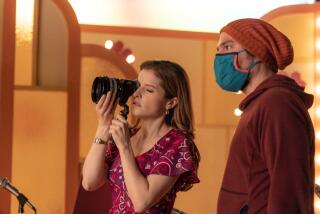Bleak and Brutal Teen Rage in Larry Clark’s ‘Bully’
- Share via
In “Bully,” photographer-turned-filmmaker Larry Clark brings alive so compellingly the aimless, brutal existence of a group of Florida teenagers that it becomes too easy to accept the film’s gratuitous and distracting nudity and fairly graphic sex as part of a telling-it-like-it-is honesty.
Upon reflection, however, it becomes disturbingly clear that Clark is himself exploiting his young people, ogling their unblemished bodies. As a result, Clark undercuts whatever aspirations he may have had in attempting to make a movie of the level of Jonathan Kaplan’s “Over the Edge” or Tim Hunter’s “River’s Edge,” two classic studies of lethally disaffected suburban youth. Whatever his intentions, Clark, in his third outing as a director, has come up with a film that is seriously flawed.
A celebrated, controversial and longtime chronicler of youth and its sexuality, Clark brings to the screen in an explosive manner a script by Zachary Long and Roger Pullis, from Jim Schutze’s book, which was based on an actual 1993 incident. Clark presents virtually all the young people in his film as doomed by clueless parents, a boring, arid environment saturated with images of violence and their own limited intelligence.
Yet Clark so undeniably cares for these kids, illuminating their out-of-control rage and passions with such clarity, that it’s hard to dismiss him as a mere sexploitation filmmaker; rather, he’s succumbed to the same temptation to have it both ways that afflicts less talented artists. In a sense, “Bully” reflects the shift in tone visible in Clark’s photo collections from the raw narrative power of “Tulsa” and “Teenage Lust” to the shallower and more exploitative “Larry Clark’s 1992” and “The Perfect Childhood.”
Brad Renfro’s Marty is a handsome but introverted high school dropout. From earliest childhood he has been bullied by Nick Stahl’s skinny, mercurial Bobby, who can make Marty do just about anything--including enduring physical abuse and public humiliation--because Marty sees no way out. Bobby also considers Marty his one true friend, and his dramatic swings between violence and tenderness grow out of a homosexuality which prompts in him denial and self-loathing. Bobby, who works with Marty at the sandwich counter at a shopping mall supermarket, thinks nothing of pimping Marty for phone sex or ordering him to do a lucrative turn as a male stripper. Drugs fuel rage in both, with Marty becoming more and more angry at Bobby, who in turn grows increasingly abusive, not only toward Marty but to the girls he attracts.
Such is the combustible situation between the friends when they pick up Ali (Bijou Phillips) and Lisa (Rachel Miner), the first as experienced as the second is not. Lisa has beauty but no style or poise to make her acceptable to her friends’ cliques, and she falls in love swiftly with Marty, both in need of affection. When Lisa speaks to Marty about Bobby’s treatment of him, there’s a moment of hope that Marty will gather the courage to break free of Bobby at last, but then Lisa’s unexpectedly dominant, amoral nature starts asserting itself.
Clark demands the utmost of Renfro, Miner and Stahl--and many others as well. Miner and Stahl respond by daringly walking a tightrope between a craziness that escalates to a dark absurdity and an all-out ludicrousness. Renfro comes across as a good kid neither strong nor smart enough to resist Lisa and Bobby’s relentlessly destructive personalities. By the time “Bully” ends, it’s still hard to know how seriously to take it. It’s a testament to Clark’s talent that it’s not easy to dismiss “Bully” as cynical--despite a temptation to do exactly that.
*
* Unrated. Times guidelines: Very strong on sex, nudity, violence, language, drugs.
‘Bully’
Brad Renfro: Marty Puccio
Rachel Miner: Lisa Connelly
Nick Stahl: Bobby Kent
Bijou Phillips: Ali Willis
A Lions Gate Films presentation of a Muse Films production. Director Larry Clark. Producers Chris Hanley, Don Murphy, Fernando Sulichin. Executive producers Mark Mower, Manuel Chiche, Arnaud Dutell, Vincent Maraval, Jordan Gertner. Screenplay by Zachary Long, Roger Pullis; based on the book by Jim Schutze. Cinematographer Steve Gainor. Editor Andrew Hafitz. Music supervisor Howard Parr. Costumes Carleen Ileana Rosado. Production designer Linda Burton. Art director Laura Harper. Running time: 1 hour, 59 minutes.
Exclusively at the Nuart, 11272 Santa Monica Blvd., West Los Angeles, (310) 478-6379; and the University, Campus Drive across from UC Irvine, (949) 854-8811.
More to Read
Only good movies
Get the Indie Focus newsletter, Mark Olsen's weekly guide to the world of cinema.
You may occasionally receive promotional content from the Los Angeles Times.









